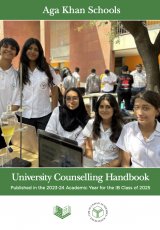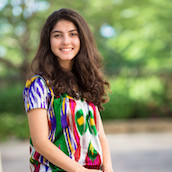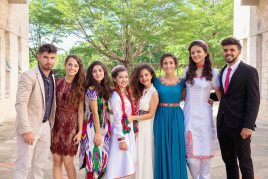From Khorog to Mombasa: The transformative power of education
For each of the past several years, a group of students about to enter secondary school have travelled from their home country of Tajikistan in Central Asia pursue their secondary education at the Aga Khan Academy Mombasa. At the Academy, these talented students have received an international standard of education they would not otherwise have been able to access, and their presence on campus has helped enhance the cultural and geographic diversity of the student body.
The first group of eight Tajik students graduated from the Aga Khan Academy Mombasa on 20 May 2017 this year, marking the conclusion of a six-year journey that began with a rigorous selection process in Tajikistan and ended in an emotional graduation ceremony. Aleesha Suleman spoke with two of these students, Nafisa Rahimjonova and Alisher Abdumamadov, about their experiences in Mombasa, the transformation they’ve undergone as a result of their unique educational opportunity and their future aspirations.
Aleesha Suleman (AS): When you look back at yourself six years ago and compare that to how you are now, what are some of the biggest changes you see in yourself?
Nafisa Rahimjonova (NR): Personally, I would definitely say higher self-esteem and self-confidence, becoming a global citizen and developing a cosmopolitan mindset. Our education, both through the IB [International Baccalaureate programmes] and the Academy developed our character rather than just knowledge. It gave me the tools and drive to learn what I’m passionate about.
Alisher Abdumamadov (AA): When I think of myself in year 6, I was not very open to other people and I would say, not very open-minded. However, I feel that I am now much more open-minded and can interact with and appreciate people who are very different from me. We have also had the opportunity to learn about different cultures and religions. Furthermore, we have been empowered to believe that we can make a difference in the world through our actions, however small.
AS: Does your family notice any difference in your personality when you go home over the summer?
NR: For me, it’s the independence which they notice the most. After being away from home for a long time, I’ve learned how to do many things on my own, make my own choices and know that those choices have consequences. I know my parents miss me being dependent on them, but they are also very proud that I am independent and responsible.
AA: My parents trust me a lot more than they used to before and I can see this difference in the responsibility they give me. Even when they talk to us, I can tell that they feel we are more mature and can handle things on our own.
AS: The Tajik students at the Academy recently hosted an event ‘Pamir: Roof of the World’ which took the audience on a journey to Badakhshan and its vibrant culture. Being so far away from home in such a different environment, how are you able to maintain those connections to your roots?
NR: This has been something very important to us, precisely because it is so difficult. We really try to remind each other about our values and our culture, especially when we realise that someone is losing themselves or making a wrong choice.
AA: In a place where there are a lot of different people with various backgrounds, it is tempting to try and fit in, but I think what is more special is to be able to stand out through our cultural beliefs and practices. For us, the person who reflects this balance in the best way is Ms Rukhshona [Russian teacher & Tajik student programme coordinator for the Aga Khan Academy Mombasa]. She is Westernised in some ways, but she holds on to our cultural roots and practices. Seeing the way she lives her life is what keeps us in check and inspires us.
NR: Another great platform was the enrichment [extracurricular club] that Ms Rukshona offered called Tajik Culture and Language which enabled us to explore different aspects of our history and culture that we had not known about before and which sparked our interest in the topic.
AS: What was the impact and importance of you learning Russian?
NR: It has kept us connected with the…Soviet part of our heritage [laughing]. We still have strong ties to Russia economically and in some ways, socially; television is a good example. The culture and language is still very important in Tajikistan so it keeps our connection to home as well, especially since Shugni has only recently begun to be written.
AA: The other part of it is that since we have had the opportunity to get a high quality education, we have the responsibility to give back to our society. When we do return to Central Asia, since English is not as widely spoken, being able to socialise and work in Tajik and Russian would make a big difference.
AS: What are your future aspirations after graduating from the Aga Khan Academy Mombasa?
AA: I am planning to go to the University of Central Asia in Naryn, Kyrgyzstan. I would like to study business and entrepreneurship, focused on Central Asia. I would like to go back to Tajikistan and take some time to learn more about the current environment to assess what kinds of initiatives would serve the greatest needs and have the biggest impact. For example, Kenya changed the statistics of access to banking by introducing mobile banking [M-Pesa]. Since there are some parallels between Kenya and Tajikistan in this area, an initiative like this could change the lives of many people.
NR: For my undergraduate degree, I will be going to the University of Western Ontario in Canada to pursue a degree in Social Sciences and Humanities [Nafisa is one of 10 recipients of an Aga Khan Academies Ontario post-secondary tuition fee waiver], and later, doing a Master’s which would equip me to work in the education sector. I discovered my passion for education through my Aga Khan Development Network internship [carried out by Grade 11 students in the summer before going into their final year]. I worked with the University of Central Asia on a report about the higher education system in Tajikistan. Through my research, I analysed the education system across different levels in Tajikistan. The report really opened my eyes to the current state of the education system, and because I could compare that to the education I have had the privilege to have, I wanted to make a change for the better, especially at the secondary level.
His Highness the Aga Khan, founder and chairman of the Aga Khan Development Network, believes firmly in the power of education to transform lives and communities. As the students from the Aga Khan Academies take the next step in their lives, more than anything, they carry within them a responsibility to give back to society, a nuanced understanding of their own identities and the cultural fluency to build bridges between people for the betterment of all.
By Aleesha Suleman
Newsletter readers please click here to return to the newsletter (browser version)
publications







